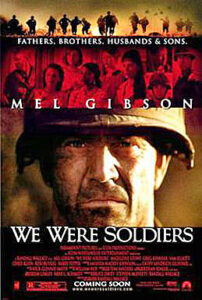 My review of “We Were Soldiers” was published in The Kansas City Kansan on March 2, 2002.
My review of “We Were Soldiers” was published in The Kansas City Kansan on March 2, 2002.
∞∞∞∞∞
By Steve Crum
Following a bloody battle, Mel Gibson’s Lt. Col. Hal Moore grimaces, “I’ll never forgive myself—that my men died…and I didn’t.” The heroic Moore is the central focus of We Were Soldiers, which opened yesterday. Expect a no-punches-pulled war movie, set in Vietnam, that will make even a ‘Nam veteran cringe at the violent realism. (I speak as a Vietnam era vet.)
War film realism was forever reshaped after Spielberg’s Saving Private Ryan, much as science 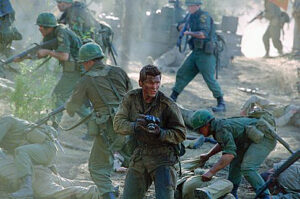 fiction movies since Star Wars have been influenced. The recent Black Hawk Down is an example of the former.
fiction movies since Star Wars have been influenced. The recent Black Hawk Down is an example of the former.
In director-writer Randall Wallace’s We Were Soldiers, based on a factual book, Lt. Col. Moore leads 400 Rangers into the first American battle of the Vietnam War. They have underestimated the North Vietnamese enemy strength, which is five times theirs. The ensuing fight is horrifyingly blood and, at times, seems destined to be a Little Big Horn for Wallace and his men. The fact is that Moore’s assignment is with the First Battalion of the Seventh Cavalry, the same regiment once led by Gen. George Armstrong Custer.
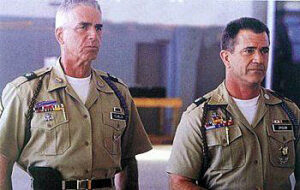 Early on, Wallace has nightmares that his destiny is akin to Custer’s, but is verbally slapped back into the reality that “you aren’t Custer, sir!” by his stern sidekick, Sgt. Major Plumley (Sam Elliott). Elliott, by the way, is superbly gruff in this film.
Early on, Wallace has nightmares that his destiny is akin to Custer’s, but is verbally slapped back into the reality that “you aren’t Custer, sir!” by his stern sidekick, Sgt. Major Plumley (Sam Elliott). Elliott, by the way, is superbly gruff in this film.
There is a lot to like about We Were Soldiers. Gibson’s inspired performance was chiseled from the real life Hal Moore, and the still very much alive Moore even oversaw all aspects of the filming—in person. Battle scenes are reportedly carbon copy true. I believe it; and thank God I was not there during the 1965 original.
Another plus of the film is the use of juxtaposition. At various times during battle, Randall jumps the story—in quick time—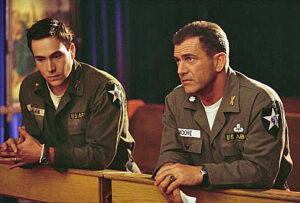 to the home front at Ft. Benning, Ga. We see Moore’s wife, Julie (Madeleine Stowe) who is literally her husband’s counterpart. It is her chosen (and wrenching) duty to personally deliver the telegrams fo death notification to the wives of the soldiers serving under her husband.
to the home front at Ft. Benning, Ga. We see Moore’s wife, Julie (Madeleine Stowe) who is literally her husband’s counterpart. It is her chosen (and wrenching) duty to personally deliver the telegrams fo death notification to the wives of the soldiers serving under her husband.
Those scenes, along with opening sequences of Moore playing and praying with his young children, as well as showing his obvious love for his wife, set the tone of the story. We are talking love of God, family and country.
Moore is everyone’s daddy in this film, and I don’t say that in a negative way—even though the movie is so clearly manipulative in its patriotism. Based on Joseph L. Galloway and Moore’s best seller, We Were Soldiers Once…and Young, Wallace’s screenplay is full of lump-in-your-throat hero-speak.
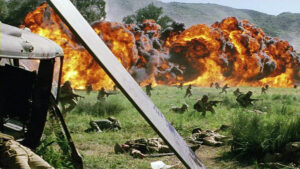 Moore, to his men before departure to Vietnam: “This I swear, when we go into battle, I will be the first to step on the field and I will be the last to step off. And I will leave no one behind…dead or alive. We will all come home together.” John Wayne would have fought a regiment to play Moore.
Moore, to his men before departure to Vietnam: “This I swear, when we go into battle, I will be the first to step on the field and I will be the last to step off. And I will leave no one behind…dead or alive. We will all come home together.” John Wayne would have fought a regiment to play Moore.
And won’t Moore’s words be remembered in movie history as much as the opening speech in Patton?
As in the book, the film humanizes the North Vietnamese…to a degree. They are given distinguishing personalities, like the soldier who looks at a picture of wife before battle begins. Scenes jump to and fro during the fighting, showing what strategies are discussed by both sides.
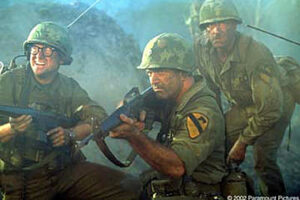 We Were Soldiers is not the first realistically violent movie about the Vietnam War. Platoon takes that dubious honor. Neither is it a jingoistic treatment like The Green Berets. And it is not a psychological, artsy Apocalypse Now spectacular.
We Were Soldiers is not the first realistically violent movie about the Vietnam War. Platoon takes that dubious honor. Neither is it a jingoistic treatment like The Green Berets. And it is not a psychological, artsy Apocalypse Now spectacular.
It is gritty and moving. It is the best Vietnam War movie ever.
∞∞∞∞∞
RATING on an A-F Scale: A
∞∞∞∞∞
